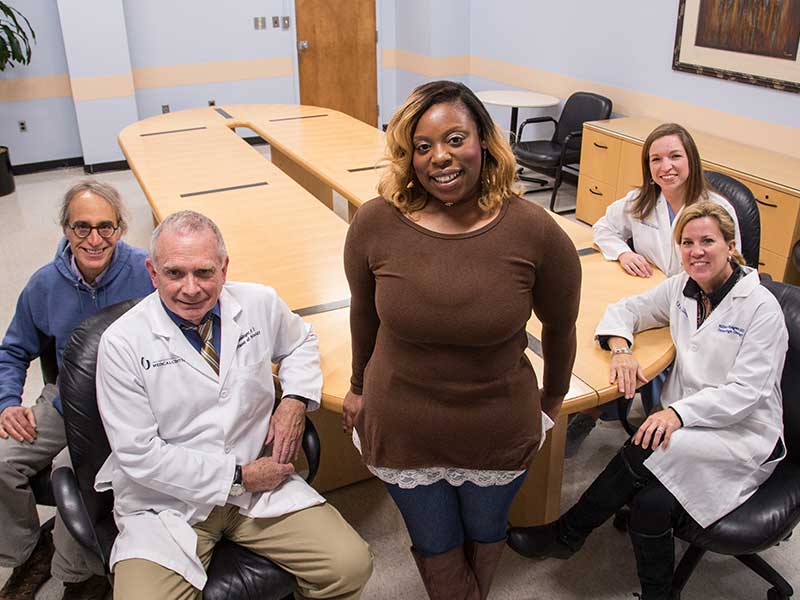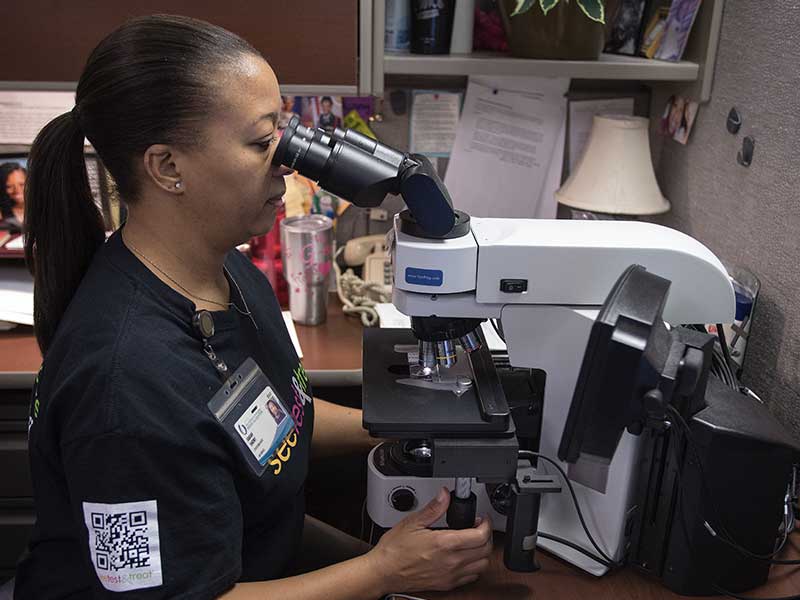Cancer survivor urges others to get breast, cervical cancer screenings

Tomeka Harps transformed her despair upon receiving a cervical cancer diagnosis to determination to help other women avoid it.
Harps, a Brandon resident, discovered she had cancer at the See, Test & Treat® screening offered at the University of Mississippi Medical Center Cancer Institute on Jan. 28 of last year.
UMMC worked with churches, local federally qualified health centers and cancer advocacy and prevention groups to offer free breast, cervical screenings and a dermatological assessment to uninsured and underinsured women.
This year, as the groups prepare to repeat the screening, Harps is at the forefront in encouraging women to just go do it.
“I use any opportunity to tell someone to go get screened,” said the mother of three. She has spoken at church and women’s groups and individually to friends and relatives.
“That has been a mission that God placed on my heart and my spirit. They open up to me when they hear my story. They tell me the issues they are having.”
She’ll be there this year on Jan. 27 when Mississippi’s second See, Test & Treat® screening is offered. Much of the project is funded through a grant from the College of American Pathologist’s Foundation.
At UMMC, Dr. Kim Geisinger and Dr. Stephen Raab, both professors of pathology, were instrumental in getting the CAP award and starting the screening.
“We diagnose cancer. We also want to prevent it,” said Geisinger.

The screenings help discover cancer early when it is more easily treated and the prognosis is better. Breast mammograms help doctors see lumps that women may not be able to feel. Pap tests can help doctors find cancerous and pre-cancerous lesions. Discovering pre-cancerous tissue enables a woman to be treated before it becomes malignant.
The See, Test & Treat® program provides same day results, with radiologists reading the mammograms and meeting with the women, and pathologists examining the Pap test slides, sitting with the women tested and explaining the results. UMMC’s program also offers a dermatology assessment.
Representatives from local and state programs also participate offering women information on access to continued health care. Other representatives will be available to offer cancer screening information and smoking cessation tips and information.
Harps, 34, was the only woman who was found to have cancer in the 2017 screening.
She arrived that Saturday with encouragement from her New Horizon Church congregational nurse Ella Jackson. “It was Stage 2B,” Harps said. By Monday she was back at the Cancer Institute to see Dr. Mildred Ridgway, head of the UMMC Gynecologic Cancer Program, to do a biopsy. Tuesday, Geisinger provided pathological results and the following day Harps had a treatment plan.
Throughout her journey, she said, church members surrounded her and her family with love, encouragement and care. They washed, cooked, cleaned, ferried her children to activities and told her husband, “Just go to work.”
She’s spent this year completing treatment and encouraging women to be screened. One included a relative who had never been screened. “She was like, ‘I don’t want to know.’”
“I said, ‘yes, you do. If they catch it early, they can save your life,’” Harps said. Her relative was screened and was fine. But Harps said she’s heard that excuse from others too.
“You should want someone to treat it, get rid of it, so you can go on with your life. I tell people, ‘you need to change your train of thought.’”
Harps’ story and her willingness to discuss it also have led to her being featured in a Cancer Today article on screening and its effectiveness; and joining Geisinger and Raab in December to help kick off the CAP Foundation’s Engaged Leadership Academy in Chicago.
The 2018 See, Test & Treat® offers mammograms, a cervical cancer screening (Pap test) and a dermatological assessment. Results will be provided the same day.

Cervical results take about two hours to complete. Women can learn about community health services, see a food and physical fitness demonstration and learn more about women’s health screenings while they wait. A financial counselor also will be available to consult about health insurance.
Working with community partners such as the churches and state and local health groups provides a better safety net for women, Raab said.
“This is a great opportunity to see if we can change the way we deliver health care so the data will change,” he said. “In five years I hope Mississippi would be the model state that has figured out how to do this.”
Currently, Mississippi has a breast cancer incidence rate of 115.5 per 100,000 (national rate is 123.5) and a cervical cancer rate of 9.6 per 100,000 (the national rate is 7.5). However, mortality or deaths from breast cancer have a 23.9 per 100,000 rate (national rate is 21.2) and cervical cancer has a 3.5 per 100,000 rate (national is 2.3), according to statistics from the National Cancer Institute.
The 2017 screening showed the joint effort could work. Churches helped recruit women to the screenings, the FQHCs, state health department and other support groups were on hand the day of the event to share services they could offer and register women who qualified.
Raab expects this year’s event will help mark a path other communities can follow “so we can replicate this more than one day a year.”
UMMC nurses and physicians and CAP already are working with groups in Rolling Fork to offer a similar screening on Feb. 17.
Eventually, Raab said, he expects community leaders will run the screenings and call on medical providers to participate.
The Jan. 27 program at UMMC will include a light snack/meal and limited child care. Screening is by appointment only to women who qualify. To determine eligibility and receive an appointment, call (601) 815-3572.


